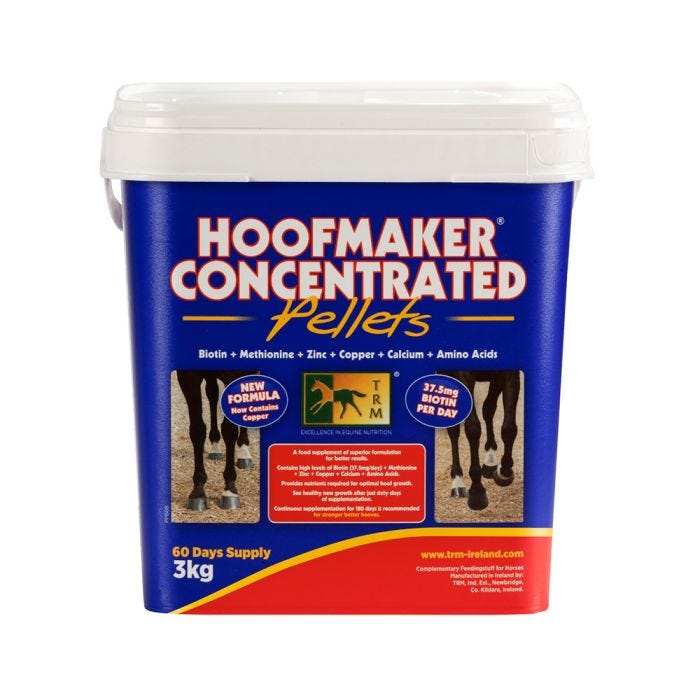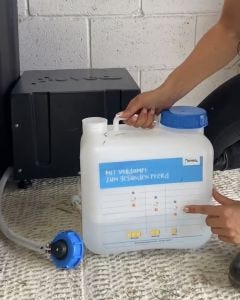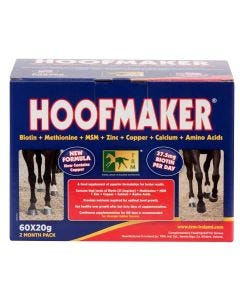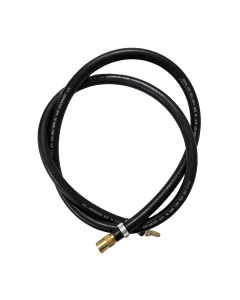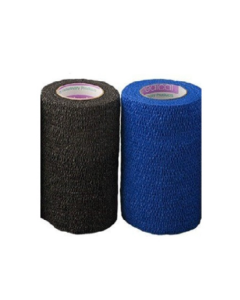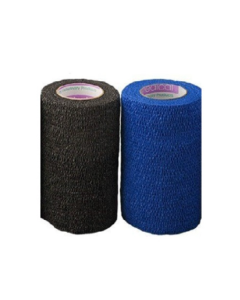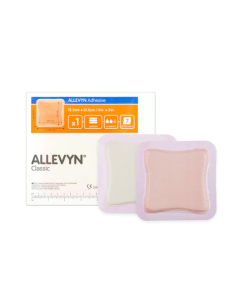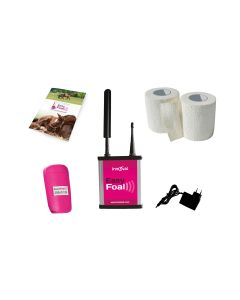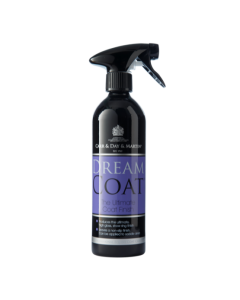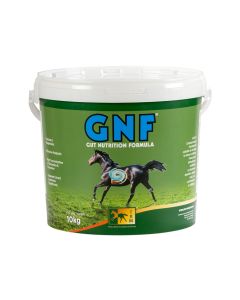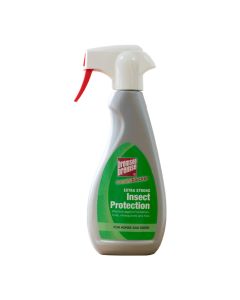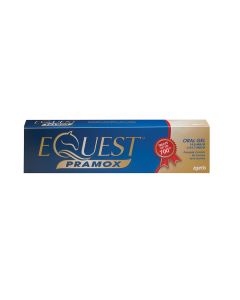All horses: Feed 50g (1 heaped scoop) per day.
Ponies and foals: Feed 50g every second day.
For best results it is recommended to feed Hoofmaker Concentrated Pellets for 180 days. New improved hoof growth will be evident near the coronary band after just one month.
Complies with FEI & Jockey Club rules
How does Hoofmaker work?
Zinc
The major function of Zinc in the body is to act as a component of many metalloenzymes involved in protein and carbohydrate metabolism. Zinc compounds are the oldest form of therapy for connective tissue disorders. Zinc is essential for DNA and protein synthesis and is paramount for the healing of damaged epithelial cells. As keratin is largely a proteinaceous material, zinc is an essential ingredient in Hoofmaker for the proper healing of hoof horn tissue. In healthy animals, zinc deficiency is related to depressed utilisation of amino acids and sulphur. Therefore, Hoofmaker contains a concentrated source (600mg of elemental zinc per 20g sachet) of this essential trace element to promote optimal growth and healing in the hoof horn.
Biotin
Biotin is a member of the B vitamin family yet historically, biotin was referred to as vitamin H. Biotin is a sulphur-containing vitamin. Green pasture is the best source of dietary biotin. Horsesǃ٠also get a supply of biotin and other B vitamins as a by-product of bacterial activity in the hindgut. However, modern husbandry of the performance horse necessitates large periods of time with little or no access to good quality pasture. Horses in training fed a high grain / low forage diet can often suffer a B vitamin deficit due to the fact that rapid starch digestion will reduce the natural pH in the caecum. This net result is the depletion of the B vitamin-producing bacteria in the hindgut. Therefore, all stabled horses in training are potentially at risk of a biotin deficiency.
Horses at risk of a biotin deficiency:
- Lack of biotin in the diet.
- Loss of microbial gut activity, from antibiotic therapy or altered gut motility.
- Pregnant and lactating mares, or aged geriatric horses.
- Inherited diseases of biotin metabolism.
- Biotin Supplementation.
The recommended daily allowance (RDA) of biotin for a 500kghorse is 2 mg per day.5 However, research has shown that increased supplementation of biotin in the diet of horses with hoof problems resulted in improved hoof growth and overall hoof integrity.6,2 Every 50g scoop of Hoofmaker contains 37.5mg of biotin. This is a concentrated level which maximises biotin absorption in the small intestine. Biotin supplementation will enhance the repair of hoof defects and, will help prevent their recurrence. There is good scientific evidence that biotin supplementation improves hoof strength, and decreases the incidence of heel horn junction cracks, sidewall horn cracks and lameness. In one study undertaken by Comben et al.,2 40 horses with a history of chronic foot problems were supplemented with 15mg of biotin per day. These horses had varying symptoms ranging from brittle ǃÚdishedǃ٠hooves to tender crumbling hooves with toe and heel cracks. After five months of treatment, previously sceptical farriers were amazed at the change in the hoof horn of these horses. The feet had developed a better shape and the horn of the hoof walls was thicker and harder. Farriers reported that shoes could be nailed on more satisfactorily and because there was improved hoof growth, there was more opportunity to shape the hooves. These researchers reported that improvements were evident within 3-6 months of biotin supplementation, with continued improvement noted for up to 12 months. However, Comben failed to report that biotin supplementation had little or no effect on some of the horses. It is also reported that biotin supplementation is effective only for horses with hoof defects involving the stratum externum.3
Professor S. Kempson from the University of Edinburgh undertook a study to investigate hoof horn defects with the use of a scanning electron microscope. The team at Edinburgh found that it was possible to locate the exact origin of the hoof defect in the hoof horn. They discovered that some cracks were located in the stratum externum. Cracks in this layer typically showed a loss of horn material in the outer layer. Other cracks involved the stratum medium and the stratum internum due to a breakdown of structural organisation in these layers.3 On further scrutiny, they realised that horses with defects in the stratum externum responded very well to biotin supplementation, whereas cracks that involved the deeper layers benefited most from the addition of protein and calcium to the diet. Most people do not have access to scanning electron microscopy, therefore it is impossible to say where the weakness originates from in the hoof horn. Hoofmaker is a complete hoof supplement which will supply all of the nutrients to care for every layer in the hoof horn. Hoofmaker is the optimum supplement to use in cases of chronic foot problems.
Calcium
As already mentioned above, Professor Kempson found that horses with defects in the stratum medium and stratum internum responded better to supplementation with a combination of calcium, protein, bioavailable sulphur and biotin, rather than just biotin alone. High levels of protein in the diet favour the uptake of calcium as opposed to phosphorus. Hoofmaker contains calcium and a high level of amino acids, the building blocks of protein. The team at the University of Edinburgh in Scotland concluded that the addition of calcium to the diet of horses, often alleviated hoof problems that did not respond to just biotin alone. ǃ˙In conclusion, these observations have revealed two types of structural defect in the horn of horses with brittle feet. The second type of defect may fail to correspond to biotin supplementation but will show improvement with increased calcium and increased protein in the dietǃ˘.3 Any horse that is fed too much bran or any high phosphorus, low protein diet will inhibit the uptake of this important mineral. Of further consequence, large intakes of bran are associated with an elevated level of phosphorus, which is often a precursor to a sudden outbreak of laminitis.7 The addition of calcium to the diet has both therapeutic and prophylactic properties for laminitis. Therefore Hoofmaker is an ideal supplement for horses with chronic foot problems and horses that may be at risk of laminitis, or indeed horses that are recovering from the illness. Hoofmaker contains 7,500mg of calcium carbonate, the level recommended by Professor Kempsom at the University of Edinburgh.
Amino Acids
Hoofmaker contains a full assay of dispensable and non-dispensable amino acids. These nutrients are the building blocks of protein. Their inclusion in Hoofmaker is very important for complete healing and improved integrity of keratin sulphate ÇƒÏ the main protein in the hoof horn.
Summary
Keratin sulphate is the main structural component in the hoof horn. Keratin synthesis is dependant on several mutually inclusive factors:
- Biotin ÇƒÏ is a necessary component for the synthesis of keratin.
- Protein ÇƒÏ as keratin is a mucopolysaccharide compound.
- Bioavailable-available sulphur ÇƒÏ keratin has a high sulphur content.
- Calcium ÇƒÏ this trace element is essential for structural cohesion in the hoof horn.
- Amino acids ÇƒÏ as these nutrients are the building blocks of protein.
- Moisture content ÇƒÏ keratin sulphate has a great affinity for water. Water availability is very important for the laying down of hoof horn and the natural elasticity of the hoof horn.
- Hoofmaker is a complete hoof supplement as it contains high levels of biotin, calcium, zinc, methionine, copper, bioavailable-available sulphur and amino acids to help aid any hoof problems.
The use of Hoofmaker will result in:
- Improved rate of hoof growth.
- Improved hoof strength and quality.
- Cracks and brittleness disappear over treatment period.
- Hooves develop a better shape.
- Walls become thicker and tougher.
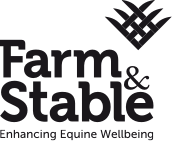

 Forgotten your password?
Forgotten your password?  Free Delivery on all orders over £95+VAT
Free Delivery on all orders over £95+VAT
 HOOFMAKER_PELLETS_MSDS_1.pdf
HOOFMAKER_PELLETS_MSDS_1.pdf